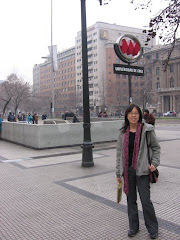So What Does a Missionary Do Next?
About two years ago, when I first decided to give up a career in publishing and spend a year abroad in Peru, I had a vague idea that I when I came back home I could find another job in publishing, or switch to non-profit work if I really enjoyed my time with the mission. Of course I didn't realize that I'd come back to the worst economy since 9/11 (coincidentally, the last time I was looking for a job!).
I also didn't realize how much Peru would change me. Getting back into the mindset of interviews and salary negotiations after living in a largely poor, informal economy feels a little wrong. To go back to a shiny office building or a company with a work force in the hundreds or thousands where you might never see your suppliers or customers face to face just seems so impersonal, and I think probably takes away much of the joy of working.
In Peru there are very few corporations, and the vast majority of the economy is informal – that is, totally unregulated and untaxed manual labor or street businesses. With so little rule of law, carrying out business or charity or almost any kind of work involves tons of individual relationship-building and flexibility. Picking up some of those traits seems to have helped me in my personal life, but they don't exactly translate to the working world here.
I soon realized I would probably feel the most at home in a small startup, where the pace is as unpredictable, and the multi-tasking as extreme, as what I experienced in Peru. One type of job that I kept coming back to, through referrals from friends or responses to my resume, were jobs working for churches and ministries. Peru Mission was focused on helping people, particularly the marginalized or isolated, form communities and relationships in the context of the church. It sounds cliche, but having experienced both a "rich" and "poor" country, money is definitely not the answer; and all peoples, whether slum-dwellers in poor nations or alienated yuppies in the developed world, could benefit from more churches that are building up their communities. (Side note: I acknowledge a lot of churches aren't doing a very good job of that, but that's all the more reason to try to help change things, right?)
After talking to several different ministries over the past few months, I'm thrilled to finally have a job with Redeemer Labs, a pilot project of my old church in New York, Redeemer Presbyterian. (See the recent books published by our senior pastor Tim Keller, The Reason for God and The Prodigal God.) Basically I'll help to build an online resource, and an online community, that will serve people trying to do ministry in cities all over the world. I can envision this kind of web portal being used by the Peruvians I worked alongside with, which for me is the ultimate measure of success.
Working for a church will not exactly be a path to financial or job security in this economy. But Peru greatly increased my risk-tolerance and sense of adventure, so we'll see where this path takes me... I can't wait.
SOOO Behind
14 years ago

